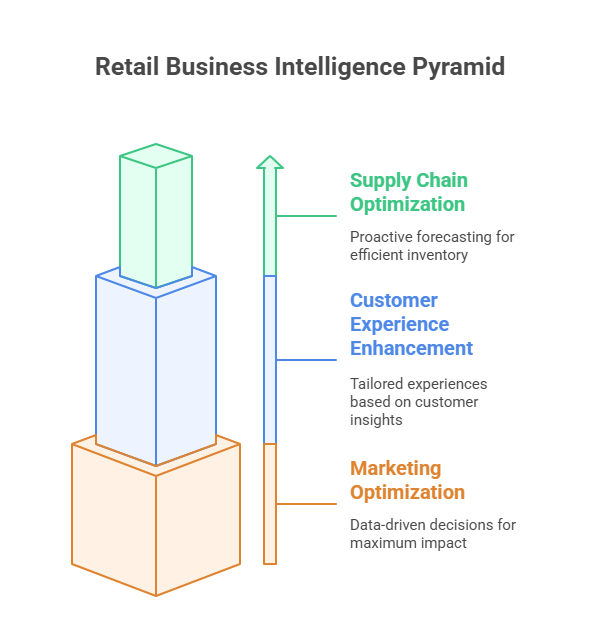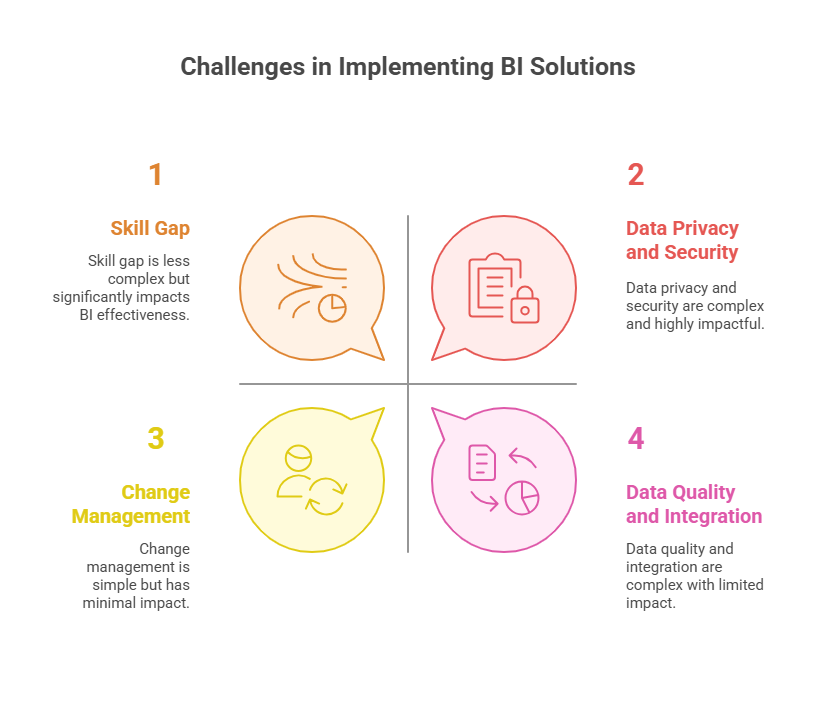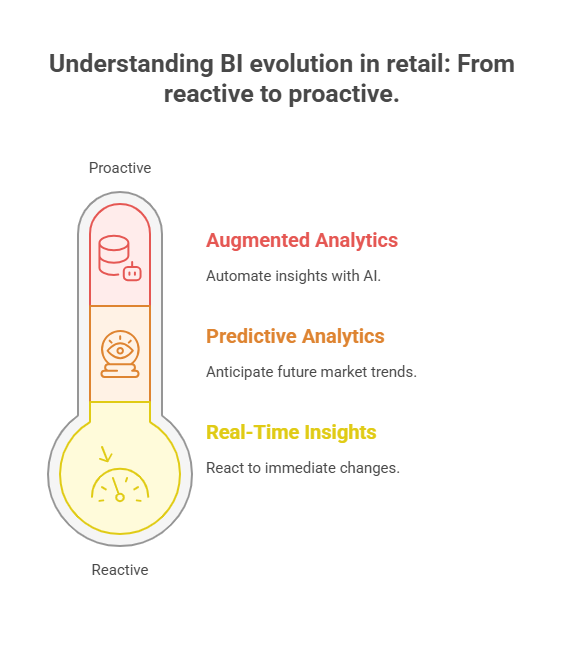Welcome to the new age of retail, where the landscape is shifting beneath our feet. If you’re not feeling the tremors yet, you will soon. Gone are the days when businesses relied solely on gut instincts and guesswork to make decisions. Today, data reigns supreme, and that’s where retail business intelligence (BI) comes into play.
This powerful tool has become a cornerstone for retailers aiming to not just survive but thrive in a fiercely competitive environment. By harnessing the power of data, you can make informed decisions, optimize your operations, and deliver exceptional customer experiences. Let’s dive into how BI in the retail industry is not just a trend but a vital component of successful strategies today.
So, what exactly is retail business intelligence? It’s more than just crunching numbers; it’s about unlocking actionable insights that can propel your business forward. In the retail world, BI plays a pivotal role in optimizing various aspects of your business:
Imagine transforming your supply chain from a reactive operation into a proactive powerhouse. With retail business intelligence, you can analyze sales data, inventory levels, and supplier performance to forecast demand accurately. This means fewer stockouts and optimized inventory turnover. As a result, you cut costs while ensuring that products are available when and where customers need them.

At the core of successful retail lies a deep understanding of your customers. BI helps you gain invaluable insights into customer behavior, preferences, and buying patterns. By analyzing data from various sources, like point-of-sale systems, loyalty programs, and website interactions, you can identify trends and segment your customers. This leads to a more tailored and engaging shopping experience, fostering loyalty and driving sales.
Effective marketing hinges on knowing your audience. With retail business intelligence, you can make data-driven decisions about your marketing campaigns, product promotions, and pricing strategies. By analyzing customer demographics, purchase history, and campaign performance, you can optimize your marketing efforts for maximum impact.
Let’s explore some key areas where BI exerts a significant impact, enabling data-driven decision-making across various functions:
Think of retail business intelligence as your crystal ball. BI empowers you to forecast future trends, optimize inventory levels, and anticipate customer demand. By analyzing historical sales data, customer behavior, and even external factors like economic indicators, you can make informed decisions about product assortment, pricing, and promotions. For instance, BI can predict peak sales periods, allowing you to adjust staffing levels and inventory accordingly.
In retail, the ability to monitor key performance indicators (KPIs) in real time is crucial. BI dashboards can provide up-to-the-minute insights into sales figures, inventory levels, and customer behavior. This enables you to identify issues promptly, like stockouts or declining sales, and take corrective actions before it’s too late.
Understanding how your customers feel is essential for building brand loyalty. BI tools can analyze customer feedback from social media, online reviews, and surveys to gauge overall sentiment and identify areas for improvement. This information can help you address customer concerns, enhance products or services, and boost overall satisfaction.
By leveraging BI for predictive analytics, real-time monitoring, and sentiment analysis, you can gain a competitive edge, optimize operations, and drive growth.
Now, here’s where things get exciting! The true power of retail business intelligence is unleashed when it’s integrated with advanced technologies like Artificial Intelligence (AI), the Internet of Things (IoT), and machine learning. This combination creates a potent synergy that drives innovation and delivers exceptional business outcomes.
Imagine AI algorithms embedded in your BI tools, uncovering hidden patterns and correlations within massive datasets. This allows you to make more accurate predictions, optimize pricing strategies, and identify new market opportunities. For example, AI can analyze customer purchase history to recommend personalized product offerings.
IoT devices are everywhere, generating a wealth of data about customer behavior, product performance, and store operations. By integrating IoT data into your BI platforms, you gain real-time insights into customer preferences, inventory levels, and store traffic patterns. This lets you make data-driven decisions on the fly.
Machine learning algorithms can be applied to BI data to build predictive models. This means you can forecast sales, optimize inventory, and even predict customer churn. By analyzing past sales data and external factors, you can anticipate peak sales periods and adjust your staffing accordingly.
While the potential of retail business intelligence is immense, implementing it comes with its own set of challenges. Overcoming these obstacles is crucial for reaping the full benefits of BI.
BI relies heavily on accurate and consistent data. Ensuring data quality, integrating data from various sources, and maintaining data integrity can be complex and time-consuming. You need robust data governance practices to address these challenges effectively.
As a retailer, you handle sensitive customer data, making privacy and security paramount. Your BI implementations must comply with regulations like GDPR and CCPA. Striking a balance between protecting customer data and extracting valuable insights is essential.

To leverage BI effectively, you need a skilled workforce with expertise in data analysis, visualization, and business intelligence tools. Many retailers face a shortage of qualified talent, which can hinder their ability to fully harness the power of BI.
Introducing BI can disrupt existing workflows and require shifts in decision-making processes. Overcoming resistance to change and fostering a data-driven culture is critical for successful BI implementation.
By addressing these challenges proactively, you can maximize the value of your retail business intelligence investments.
The true measure of BI success lies in its ability to deliver tangible results. Numerous retailers have harnessed the power of BI to optimize operations, enhance customer experiences, and drive revenue growth.
Many retailers have leveraged BI to streamline inventory management, reduce stockouts, and optimize store layouts. By analyzing sales data and customer behavior, they can identify slow-moving products and improve overall store efficiency.
Effective BI implementation has led to significant increases in sales and profitability for several retailers. By understanding customer preferences and tailoring marketing campaigns accordingly, businesses have achieved higher conversion rates and customer lifetime value.
A customer-centric approach is essential for long-term success. BI helps retailers gain deeper insights into customer behavior, enabling them to deliver personalized experiences. By addressing customer pain points and exceeding expectations, retailers build strong customer loyalty and advocacy.
The retail industry is in a constant state of flux, driven by evolving consumer expectations and technological advancements. To thrive in this dynamic environment, retailers must embrace innovation and adapt to emerging trends in retail business intelligence.
The future of BI lies in augmented analytics, which combines AI and machine learning to automate data preparation, analysis, and insights generation. This empowers users of all skill levels to derive meaningful insights from complex data without extensive training.
As the pace of business accelerates, the demand for real-time insights grows. Retailers need BI tools that can process and analyze data in real time to enable quick decision-making and responses to changing market conditions.
The ability to predict future trends and outcomes is crucial for retailers. BI tools with advanced analytics capabilities can help identify potential opportunities and risks, allowing businesses to proactively shape their strategies.

As data volumes continue to grow, ensuring data quality, security, and compliance becomes increasingly important. Retailers need robust data governance frameworks and BI tools that prioritize data protection.
The shift towards cloud computing is transforming the BI landscape. Cloud-based BI solutions offer scalability, flexibility, and cost-efficiency, making them an attractive option for many retailers.
By staying ahead of these trends and investing in BI capabilities, you can gain a competitive edge, improve operational efficiency, and deliver exceptional customer experiences.
In today’s rapidly evolving retail landscape, retail business intelligence has emerged as a cornerstone for driving growth and success. By harnessing the power of data, you can optimize operations, enhance customer experiences, and make informed decisions. As the retail industry continues to change, BI will play an even more critical role in shaping the future.
To fully realize the potential of BI, it’s essential to invest in data quality, develop a data-driven culture, and leverage advanced technologies. By embracing BI, you can unlock new opportunities, improve profitability, and build lasting customer relationships.
Are you ready to transform your retail business with the leading retail software development company? Contact us today to learn how our BI solutions can help you gain a competitive edge!
Retail business intelligence (BI) is the use of data analysis tools and techniques to optimize decision-making in retail. It helps businesses transform raw data into actionable insights, allowing them to improve supply chain efficiency, enhance customer experiences, streamline marketing strategies, and ultimately boost profitability in a competitive marketplace.
BI enhances retail operations by analyzing sales, inventory, and customer behavior in real time. Retailers can forecast demand, reduce stockouts, optimize pricing, and improve marketing effectiveness. This data-driven approach ensures better resource allocation, cost reduction, and improved customer satisfaction, creating a foundation for sustainable business growth.
BI enables retailers to understand customer preferences, buying habits, and feedback. By analyzing data from loyalty programs, sales, and digital interactions, retailers can personalize product recommendations, tailor promotions, and improve service. This leads to a more engaging shopping journey, stronger customer loyalty, and increased long-term profitability.
BI transforms supply chains by predicting demand and tracking supplier performance. Retailers can manage inventory more effectively, reduce wastage, and ensure timely product availability. By shifting from a reactive to a proactive supply chain model, businesses reduce costs while delivering the right products at the right time.
Retail BI helps optimize marketing by analyzing customer demographics, purchase history, and campaign results. Retailers can identify high-value customers, adjust pricing strategies, and design targeted campaigns. This data-driven approach maximizes return on investment, improves campaign effectiveness, and ensures that marketing efforts resonate with the right audience.
BI becomes more powerful when integrated with advanced technologies like Artificial Intelligence (AI), the Internet of Things (IoT), and machine learning. AI uncovers patterns, IoT provides real-time operational data, and machine learning improves predictive accuracy. Together, they empower smarter decision-making and create innovative retail strategies.
Retailers often struggle with data integration, quality, and governance when adopting BI. Other challenges include ensuring compliance with data privacy regulations, addressing the skill gap in analytics, and managing organizational change. Overcoming these requires strong leadership, investment in talent, and a culture that embraces data-driven decisions.
With BI, retailers can forecast demand, identify sales trends, and anticipate customer needs. By analyzing historical sales data alongside external factors, businesses can prepare for peak seasons, optimize staffing, and align inventory with demand. Predictive analytics helps retailers stay proactive and maintain a competitive advantage in dynamic markets.
Future retail BI will focus on augmented analytics, real-time data monitoring, predictive modeling, and cloud-based solutions. Enhanced data governance and security will also play key roles. These trends will empower retailers to act quickly, improve efficiency, and personalize customer interactions in an increasingly data-driven industry.
Retail BI is essential because it enables businesses to move beyond guesswork. By leveraging insights from data, retailers can enhance customer experiences, optimize operations, and make confident decisions. In a competitive retail landscape, BI provides the agility and intelligence necessary for sustained growth and long-term success.
Let Neuronimbus chart your course to a higher growth trajectory. Drop us a line, we'll get the conversation started.
Your Next Big Idea or Transforming Your Brand Digitally
Let’s talk about how we can make it happen.